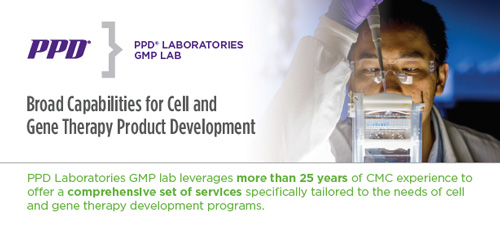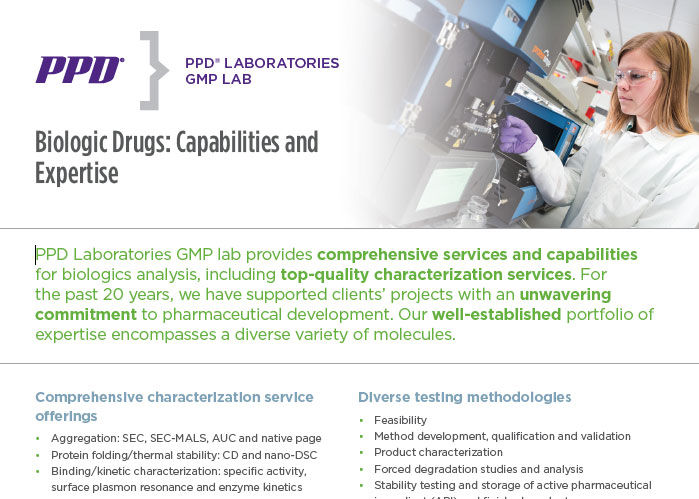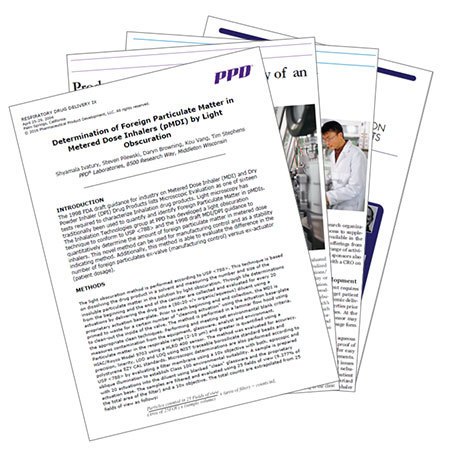
GMP Lab Experience and Expertise
More than 20 years of GMP experience and technical expertise
PPD® Laboratory Services’ GMP lab is committed to providing effective development services to meet the needs of the rapidly evolving pharmaceutical development regulatory landscape. Our GMP lab has offered client-site lab operations and management models to address challenges brought on by the evolution of the pharmaceutical development industry for more than 20 years. Our qualified scientists provide comprehensive method development, validation and quality-control testing services. We have experience working with all manner of pharmaceutical products and devices. Our expertise spans small molecules, biologics and cell and gene therapies.
Biologics
For more than 20 years, PPD® Laboratory Services’ GMP lab has helped clients develop hundreds of biologic pharmaceuticals including most of the top biologics and best-selling biosimilars.
Our biologics experience encompasses a variety of molecules:
- Proteins: recombinant, PEGylated and glycosylated
- Monoclonal and polyclonal antibodies
- Antibody-drug conjugates (ADCs)
- Hormones
- Peptides and polypeptides
- Nucleotides and oligonucleotides: siRNA, DNA, mRNA, DNAi and RNAi, synthetic and PEGylated
- Cell and gene therapy products including oligonucleotides, messenger RNAs, plasmids and viral-vectored products
- Carbohydrates and polysaccharides
- Liposomes
- Inhaled biologics
- Process impurity assays: host cell protein and DNA, isopropyl ß-D-1-thiogalactopyranoside (IPTG), surfactants and antibiotics
- Cell-based therapeutics
Our biologics services and capabilities include:
Product characterization
Product characteristic
- Primary Structure
- Secondary Structure
- Tertiary Structure
- Other Attributes
Assay capabilities
- Amino acid composition by U/HPLC-UV, LC-MS (intact mass/peptide mapping/PTM analysis)
- Free thiols, FTIR, CD (far UV)
- CD (near UV), nano-DSC, IF
- SEC-MALS, AUC, SPR, absorptivity coefficient
Release and stability
Product characteristic
- Identity
- Purity
- Potency
- Physical/Chemical Properties
- Safety/Impurities
- Safety – Microbiology
- Inactive Ingredients
- Drug Product Packaging
Assay capabilities
- ELISA, Peptide mapping (UV, MS), intact MS
- SEC, RP-, IEX-HPLC, HIC/HILIC, CE, iCE, SDS-PAGE
- ELISA, enzyme kinetics, cell-based assays, SPR, MSD
- Concentration (UV/Vis, slope ratio, micro BCA), turbidity, colorimetry, pH, osmolality, moisture, liquid and aerodynamic particle size
- Residual host cell DNA by q/ddPCR, residual host cell proteins by ELISA, residual process impurities by ELISA, visible and subvisible particulates by HIAC, MFI and microscopy
- Sterility (filtration), CCIT (vacuum decay, O2 headspace, dye ingress), endotoxins, bioburden, adventitious contamination testing
- Surfactants by CAD and ELSD, ion chromatography, HPLC-RI
- Break-loose force, glide force, next-generation impactor/Anderson cascade impactor
Extractables and leachables
Product characteristic
- Container/Closure Compatibility
- Single-Use Manufacturing Process Components Evaluation
Cell and gene therapy
Cell and gene therapies are expected to grow at a rate of 1,000% in the next five years. PPD® Laboratory Services’ GMP lab has been working with these therapeutics for the past 15 years. Our team leverages more than 25 years of chemistry, manufacturing and control (CMC) experience to offer a comprehensive set of services specifically tailored to the needs of cell and gene therapy development programs.
Expertise in cell and gene therapy
We have been building expertise with these complex development programs for nearly two decades and has worked with dozens of cell and gene therapies across a broad range of molecule types. Our expertise includes:
- Specialized sample handling to minimize nucleases and moisture uptake for hygroscopic substances
- Developing denaturing HPLC methods
- Extensive work with complex formulation types
- Separation methodologies and complete impurity analysis using multiple techniques
- Transfer of custom-developed analytical techniques for a wide range of cell and gene therapy drug substances
PPD Laboratory Services has experience with more than 60 cell and gene therapies.

years experience with cell and gene therapies.
Cell and gene therapy experience and capabilities
Our wealth of experience with cell and gene therapies includes a variety of drug substances, many different study types and extensive experience with oligonucleotides. At PPD Laboratory Services, we are dedicated to supporting clients’ cell and gene therapy programs across the phases of drug development.
Drug substances experience
- Oligonucleotides including siRNA, RNAi and DNAi
- Encapsulated and naked plasmids and mRNAs
- Viral vectors including adenovirus vectors (AdVs), adeno-associated virus vectors (AAV), baculoviral vectors (BVs), and lentivirus vectors (LVs)
- Cell-based therapeutics, including modified stem, blood and immune cells, and CRISPR/Cas9
Extensive oligonucleotide capabilities and cGMP service offering
- Full compliance with U.S. Food and Drug Administration (FDA) current good manufacturing practices (cGMP) regulations and rules governing medicinal products in the European Union
- Customized method development, transfer and validation under cGMP
- Full range of physiochemical and molecular characterization and potency assays
- Bioburden and endotoxin testing
- Safety testing
Study types
- Analytical method development and validation
- Drug substance and reference standard characterization across a range of formulations and delivery routes
- In-process sample analysis
- Quality control and release testing
- Stability testing and storage
- Comparability studies
- Forced-degradation studies
- Process and formulation development support
- Container/closure integrity testing (CCIT)
Inhaled pharmaceuticals
Developing medicines that are delivered via the pulmonary and nasal routes for the treatment of local and systemic diseases is challenging. While the demonstration of safety, potency and purity is a fundamental part of the marketing authorization process for all drugs, incorporation of a delivery device greatly increases the complexity of the drug development process.
PPD® Laboratory Services’ GMP lab has been supporting the respiratory community across the product development continuum for more than 18 years. We have depth of experience evaluating drug/device combinations and see continued growth in novel combinations and multi-active medicinal products.
In the past 10 years we have supported the development of more than 100 inhaled products of which at least 10 have received approval for commercialization by regulatory bodies.
Our experience with inhaled pharmaceuticals includes:
- Pressurized metered-dose inhalers (pMDI)
- Dry powder inhalers (DPI) and devices
- Aqueous and dry powder nasal sprays
- Nasal aerosols
- Nebulizers, solutions and suspensions
- Novel delivery systems
Key instrumentation:
- MSP Corp Next Generation pharmaceutical impactor
- Andersen-type cascade impactors
- Proveris Verio™ automated actuation stations
- Proveris SprayVIEW™ Measurement System
- Malvern Spraytec
- Copley Breathing Simulator BRS-2100
- Patented collection tubes to perform for assessment of foreign particulate matter (FPM) ex-device
- Innova Systems nasal spray pump actuation stations and MDI FD-10 automated waste stations
Analytical services offered for inhalation drug products include:
- Formulation evaluation studies
- Drug product characterization studies: device robustness, dosing orientations, effect of resting times and others
- Wide-ranging extractables and leachables program support for container/closure systems
- Drug content/stability assay development, optimization, validation, qualification and transfer
- Stability, release and QC testing
- Physicochemical characteristics for drug product and device
- Dose content uniformity and emitted dose performance
- Foreign particulate matter, impurities, degradation products and preservatives
- Container/closure integrity including leak rate
- Microscopic evaluation
- Particle size, shape and distribution
- Plume geometry and spray pattern
Method development and validation
PPD Laboratory Services’ GMP lab performs method development and validation for a broad spectrum of biopharmaceuticals and dosage forms across all phases of pharmaceutical development. Our experienced scientists provide method development, experimental design, method validation protocol development, gap analyses, remedial method validation and customized method validation reports. In addition, we have a full complement of GMP analytical testing resources and expertise to perform release testing and quality control analyses for active pharmaceutical ingredients and drug products in virtually all dosage forms and delivery systems.
Our service offerings include:
- Method development and validation for chromatography techniques including HPLC, UPLC, GC, SEC and IC with a variety of detection technologies including UV, DAD, FL, MS, ELSD, RI, PAD, FID, TCD, MALS, CAD
- Method development and validation for stability-indicating assays and related substances methods for drug substance and drug products, such as, tablets, capsules, suspensions, creams, injectables, nasal sprays, pMDIs, DPIs, medicated feeds, drug-eluting stents
- Method development, validation and quality control services for:
- Dissolution (IR, ER, MR)
- Organic volatile impurities
- Preservatives and antioxidants
- Clinical comparator assay and dissolution
- Analytical support for process and cleaning validation on various surfaces by HPLC, UPLC, TOC and GC
- Dose verification for GLP studies
- Bioequivalency, in vitro pharmaceutical equivalency testing
- Quality control support for
- Dosing solution analysis for toxicology studies
- Customer product complaint testing
- Field monitoring testing
- Generation of statistical quality control charts
Leveraging more than 20 years of experience to develop robust methods for all manner of pharmaceutical products.
Learn more about our GMP lab
Small molecules
PPD Laboratory Services’ GMP lab provides comprehensive analytical testing support for active pharmaceutical ingredients (API), intermediates, raw materials, in-process samples and finished products for all dosage forms of small molecules across all phases of drug development. We have a customizable approach to all small molecule drug development programs. Support for a variety of methodologies ranges from phase appropriate analytical method development and validation to transfer of existing assays.
Diverse methodologies and analysis support
- Stability-indicating assay and/or related substances methods for active pharmaceutical ingredient and drug product
- Clinical comparator and drug safety assays
- Aerosol device characterization methods
- Device functionality testing
- Cleaning validations on various surfaces in support of manufacturing processes
- Metals analysis
- Methods for excipients, residual solvents, process impurities, preservatives and residual compounds
- Physical and chemical characterization
- Impurity characterization and identification
- Extractables and leachables (E&L) full program support and consulting
- Bioequivalence analytical support
- In-use, freeze-thaw, shipping study design and management
- ICH stability support
Comprehensive characterization offerings
- Pharmaceutical release and stability testing
- Full structure elucidation
- Reference standard characterization
- Full structure confirmation
- Purity and impurities analysis
- Physicochemical property determination
- Log P, pKa, solubility
- Water sorption/desorption
- Thermal properties (DSC, TGA)
- Crystalline form ID by XRPD
- Particle size and foreign particulate matter
- Particulate and Chemical Identification by Raman-Microscopy
- Surface area analysis and powder flow studies
- Viscosity: absolute and kinematic
- Filing ready reports
- Method development and validation


